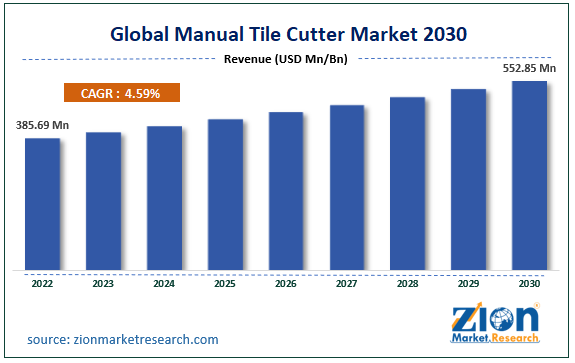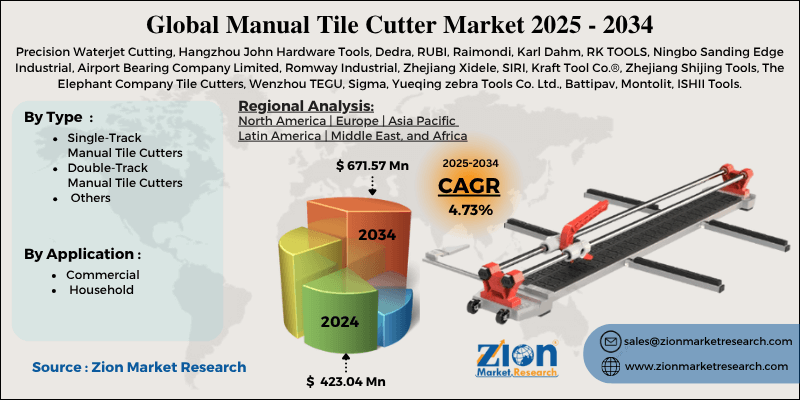Global Manual Tile Cutter Market Size, Share, Growth Analysis Report - Forecast 2034

Manual Tile Cutter Market By Type (Single-Track Manual Tile Cutters, Double-Track Manual Tile Cutters, Others), By Application (Commercial, Household), and By Region: Global and Regional Industry Overview, Market Intelligence, Comprehensive Analysis, Historical Data, and Forecasts 2025 - 2034
| Market Size in 2024 | Market Forecast in 2034 | CAGR (in %) | Base Year |
|---|---|---|---|
| USD 423.04 Million | USD 671.57 Million | 4.73% | 2024 |
Manual Tile Cutter Market: Industry Perspective
The global manual tile cutter market size was worth around USD 423.04 Million in 2024 and is predicted to grow to around USD 671.57 Million by 2034 with a compound annual growth rate (CAGR) of roughly 4.73% between 2025 and 2034. The report analyzes the global manual tile cutter market's drivers, restraints/challenges, and the effect they have on the demands during the projection period. In addition, the report explores emerging opportunities in the manual tile cutter industry.
The market report is an indispensable guide on growth factors, challenges, restraints, and opportunities in the global market space. The manual tile cutter industry report covers the geographical market along with a comprehensive competitive landscape analysis. It also includes cash flow analysis, profit ratio analysis, market basket analysis, market attractiveness analysis, PESTEL analysis, SWOT analysis, Porter’s five force analysis, and value chain analysis. Additionally, the manual tile cutter market report explores the investor and stakeholder space to help companies make data-driven decisions.
Manual Tile Cutter Market: Overview
A manual tile cutter is an instrument used for cutting ceramic and porcelain tiles in specific sizes and shapes. Moreover, it makes changes in the lateral wedges and amends irregular corners of the tile into correct tile fittings. Reportedly, these instruments are available in various types. These products are utilized for small kitchen splashbacks, ventures requiring straight cuts, and locations requiring lesser spaces.
Key Insights
- As per the analysis shared by our research analyst, the global manual tile cutter market is estimated to grow annually at a CAGR of around 4.73% over the forecast period (2025-2034).
- Regarding revenue, the global manual tile cutter market size was valued at around USD 423.04 Million in 2024 and is projected to reach USD 671.57 Million by 2034.
- The manual tile cutter market is projected to grow at a significant rate due to rising construction and renovation activities, increasing demand for cost-effective cutting tools, and growth in the ceramic and porcelain tile industry.
- Based on Type, the Single-Track Manual Tile Cutters segment is expected to lead the global market.
- On the basis of Application, the Commercial segment is growing at a high rate and will continue to dominate the global market.
- Based on region, Asia-Pacific is predicted to dominate the global market during the forecast period.
Manual Tile Cutter Market: Dynamics
Key Growth Drivers:
The manual tile cutter market is propelled by steady growth in the construction and renovation sectors, driven by urbanization, rising disposable incomes, and increasing residential and commercial building projects. DIY trends and the popularity of home improvement projects boost demand for affordable, easy-to-use manual cutters among homeowners and small contractors. The availability of a wide range of cutter sizes and designs that cater to diverse tile materials (ceramic, porcelain, and natural stone) also expands market adoption. Additionally, price sensitivity in emerging markets encourages the use of manual cutters as a cost-effective alternative to electric or wet saws.
Restraints:
The market faces restraints from the growing preference for power tools and automated cutting solutions, which offer greater precision and speed for large-scale or professional projects. Manual cutters have limitations when handling very hard materials, very large tiles, or intricate shapes, which reduces their applicability in some segments. Perceptions of lower accuracy and the physical effort required for prolonged use can discourage professional users. Furthermore, variable quality among low-cost products can lead to poor performance and increased replacement frequency, undermining customer confidence.
Opportunities:
Opportunities exist through product innovation—lightweight, ergonomic designs and enhanced scoring wheel materials can improve performance and user comfort, appealing to both DIY consumers and tradespeople. Expanding distribution through e-commerce platforms and DIY retail chains can reach new customer segments and geographies. Growth in smaller renovation projects, modular construction, and affordable housing initiatives in emerging economies presents accessible markets. Additionally, bundling cutters with accessories (rulers, tile nippers, carrying cases) and offering training content or how-to guides can increase perceived value and adoption.
Challenges:
Key challenges include intense competition from low-cost manufacturers which pressures margins and can flood markets with substandard tools. Ensuring consistent quality and safety across models while keeping prices attractive is difficult. Market fragmentation—many small, regional producers—makes brand consolidation and standardization hard. Seasonal demand fluctuations tied to construction cycles and economic slowdowns can lead to inventory and cash-flow challenges for manufacturers and distributors. Finally, educating users on correct operation and maintenance remains necessary to reduce tool misuse and warranty claims.
Manual Tile Cutter Market: Segmentation
The global manual tile cutter market is sectored into type, application, and region. All the segments have been analyzed based on present and future trends and the market is estimated from 2025 to 2034.
Based on Type, the global manual tile cutter market is divided into Single-Track Manual Tile Cutters, Double-Track Manual Tile Cutters, Others.
On the basis of Application, the global manual tile cutter market is bifurcated into Commercial, Household.
The Regional, this segment includes the current and forecast demand for North America, Europe, Asia Pacific, Latin America,and the Middle East and Africa.
| Report Attributes | Report Details |
|---|---|
| Report Name | Manual Tile Cutter Market |
| Market Size in 2024 | USD 423.04 Million |
| Market Forecast in 2034 | USD 671.57 Million |
| Growth Rate | CAGR of 4.73% |
| Number of Pages | 210 |
| Key Companies Covered | Precision Waterjet Cutting, Hangzhou John Hardware Tools, Dedra, RUBI, Raimondi, Karl Dahm, RK TOOLS, Ningbo Sanding Edge Industrial, Airport Bearing Company Limited, Romway Industrial, Zhejiang Xidele, SIRI, Kraft Tool Co.®, Zhejiang Shijing Tools, The Elephant Company Tile Cutters, Wenzhou TEGU, Sigma, Yueqing zebra Tools Co. Ltd., Battipav, Montolit, ISHII Tools, Yongkang TOPVEI., and others. |
| Segments Covered | By Type, By Application, and By Region |
| Regions Covered | North America, Europe, Asia Pacific (APAC), Latin America, The Middle East and Africa (MEA) |
| Base Year | 2024 |
| Historical Year | 2020 to 2023 |
| Forecast Year | 2025 - 2034 |
| Customization Scope | Avail customized purchase options to meet your exact research needs. Request For Customization |
Manual Tile Cutter Market: Regional Insights
North America to be a global leader in the manual tile cutter market over the forecast timeline
North America, which contributed more than 51% of the global manual tile cutter market share in 2024, is expected to lead the regional market sphere in the ensuing years. The market growth in the sub-continent over the prognosis timeframe can be subject to thriving real estate activities in countries such as Canada and the U.S. Furthermore, an increase in disposable income will contribute sizably towards the regional market earnings. Apart from this, an increase in the construction of residential buildings and a surge in the renovation of these buildings in the region will generate a robust demand for manual tile cutters in the region.
Furthermore, the manual tile cutter industry in the Asia-Pacific zone is anticipated to register the highest CAGR in the predicted timeline. The major growth factors of the industry in the region include a rise in the construction of residential buildings for the rapidly increasing population in densely populated countries such as India and China. Furthermore, schemes such as Pradhan Mantri Awas Yojna launched by the Government of India offering houses at reduced costs for economically weaker sections in India can further boost the demand for the product in the Asia-Pacific zone. Rapid improvement witnessed in the infrastructural growth and increase in construction activities in China, Bangladesh, Indonesia, and Thailand will upsurge the penetration of manual tile cutters in the sub-continent.
Manual Tile Cutter Market: Competitive Analysis
The report provides a company market share analysis to give a broader overview of the key market players. In addition, the report also covers key strategic developments of the market, including acquisitions & mergers, new product launches, agreements, partnerships, collaborations & joint ventures, research & development, and regional expansion of major participants involved in the manual tile cutter market on a global and regional basis.
The global manual tile cutter market profiles key players such as:
- Precision Waterjet Cutting
- Hangzhou John Hardware Tools
- Dedra
- RUBI
- Raimondi
- Karl Dahm
- RK TOOLS
- Ningbo Sanding Edge Industrial
- Airport Bearing Company Limited
- Romway Industrial
- Zhejiang Xidele
- SIRI
- Kraft Tool Co.®
- Zhejiang Shijing Tools
- The Elephant Company Tile Cutters
- Wenzhou TEGU
- Sigma
- Yueqing zebra Tools Co. Ltd.
- Battipav
- Montolit
- ISHII Tools
- Yongkang TOPVEI
The global manual tile cutter market is segmented as follows:
By Type
- Single-Track Manual Tile Cutters
- Double-Track Manual Tile Cutters
- Others
By Application
- Commercial
- Household
By Region
- North America
- The U.S.
- Canada
- Europe
- France
- The UK
- Spain
- Germany
- Italy
- Rest of Europe
- Asia Pacific
- China
- Japan
- India
- South Korea
- Southeast Asia
- Rest of Asia Pacific
- Latin America
- Brazil
- Mexico
- Rest of Latin America
- Middle East & Africa
- GCC
- South Africa
- Rest of Middle East & Africa
Table Of Content
Methodology
FrequentlyAsked Questions
A manual tile cutter is an instrument used for cutting ceramic and porcelain tiles in specific sizes and shapes. Moreover, it makes changes in the lateral wedges and amends irregular corners of the tile into correct tile fittings. Reportedly, these instruments are available in various types. These products are utilized for small kitchen splashbacks, ventures requiring straight cuts, and locations requiring lesser spaces.
The global manual tile cutter market is expected to grow due to increasing construction and renovation activities, rising demand for cost-effective and portable tile cutting solutions for DIY and professional use, and growing technological advancements enhancing precision, durability, and user-friendliness.
According to a study, the global manual tile cutter market size was worth around USD 423.04 Million in 2024 and is expected to reach USD 671.57 Million by 2034.
The global manual tile cutter market is expected to grow at a CAGR of 4.73% during the forecast period.
Asia-Pacific is expected to dominate the manual tile cutter market over the forecast period.
Leading players in the global manual tile cutter market include Precision Waterjet Cutting, Hangzhou John Hardware Tools, Dedra, RUBI, Raimondi, Karl Dahm, RK TOOLS, Ningbo Sanding Edge Industrial, Airport Bearing Company Limited, Romway Industrial, Zhejiang Xidele, SIRI, Kraft Tool Co.®, Zhejiang Shijing Tools, The Elephant Company Tile Cutters, Wenzhou TEGU, Sigma, Yueqing zebra Tools Co. Ltd., Battipav, Montolit, ISHII Tools, Yongkang TOPVEI., among others.
The report explores crucial aspects of the manual tile cutter market, including a detailed discussion of existing growth factors and restraints, while also examining future growth opportunities and challenges that impact the market.
HappyClients
Zion Market Research
Tel: +1 (302) 444-0166
USA/Canada Toll Free No.+1 (855) 465-4651
3rd Floor,
Mrunal Paradise, Opp Maharaja Hotel,
Pimple Gurav, Pune 411061,
Maharashtra, India
Phone No +91 7768 006 007, +91 7768 006 008
US OFFICE NO +1 (302) 444-0166
US/CAN TOLL FREE +1 (855) 465-4651
Email: sales@zionmarketresearch.com
We have secured system to process your transaction.
Our support available to help you 24 hours a day, five days a week.
Monday - Friday: 9AM - 6PM
Saturday - Sunday: Closed






